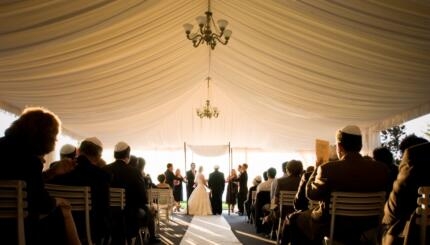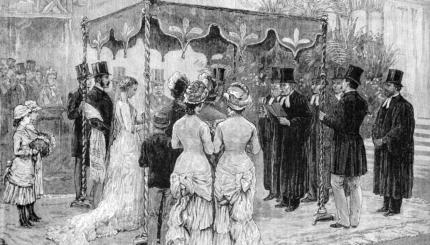Having officiated at many weddings over the years, I sometimes joked to my friends that I was “always the rabbi, never the bride.” But this summer, things have changed: I’m recently engaged and now planning my own wedding.
As a rabbi officiating at weddings, one of my jobs is to help couples think through which Jewish elements they may want to include in their ceremony. Perhaps a chuppah (a Jewish wedding canopy), a ketubah (Jewish marriage document), a breaking of a glass (almost everyone wants that!), the chanting of the seven blessings, etc. Within each of these decisions there are even more choices and questions: what kind of text will be included in the ketubah? Will it employ traditional language which essentially functioned as a legal document or will it be a text with more modern sensibilities? Will the seven blessings be recited in Hebrew or English or both? Which translation will be used? And which explanation of the breaking of the glass will I provide? There are many! I even have some couples now where both partners want to break the glass – how fun!
So many choices. Having a rabbi or cantor officiate a ceremony (rather than just a friend ordained for the day) often allows people the opportunity to connect to and learn about Jewish rituals around marriage. You may not choose to include all of the traditional Jewish elements at a wedding, but it’s always important to know what your options are and what the meaning behind each one is. Whether I’m officiating an interfaith wedding or a Jewish-Jewish wedding, it’s a chance to create a ceremony that speaks to and reflects the identity of each partner.
I’ve spent many years as a rabbi guiding people through the components of the ceremony. Now that it’s my wedding, it’s a chance not just to think about the ceremony, but also the reception, and where my fiancé and I share values that will inform those decisions as well. It’s not just about venues, caterers, and color schemes (though those are fun to think about!).
We are choosing, for example, to create a wedding with a value of ba’al taschit (do not be wasteful). We’re considering emailing our invitations to save trees, serving seasonal and local food, and creating centerpieces that can be repurposed: perhaps board games that we can then donate to a children’s organization. When we asked a venue to create a feel of a casual lounge, they quoted us for rental couches, tables, rugs, and chairs. The price was so high to rent furniture for a few hours that we decided we’d rather buy some furniture for the day with the plan of donating it to a few families in need at the end of the event.
Have you been to or created a lifecycle event informed by your values? If so, please share in the comments.
So often, lifecycle events allow us the opportunity to focus on our values: to explore what matters to us, the choices we make, and the lenses through which we engage with the world.
For more on Jewish weddings, click here.
Jewish food, holidays, Torah, Shabbat, history, blogs and more in your inbox – sign up now!



